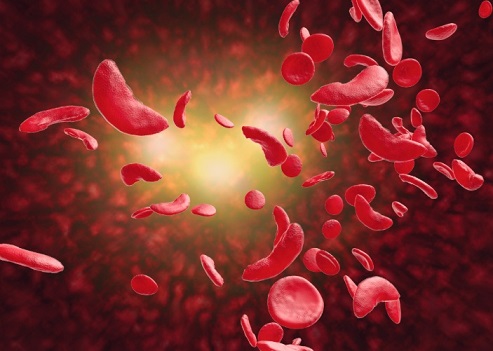Nikhil Prasad Fact checked by:Thailand Medical News Team Jan 15, 2025 2 months, 4 weeks, 1 day, 7 hours, 40 minutes ago
Medical News: A groundbreaking study has shed light on how COVID-19, caused by the SARS-CoV-2 virus, affects red blood cells and potentially influences disease severity. This collaborative research effort involved experts from the Institute of Molecular Biology of NAS RA, Yerevan State Medical University, and the National Center of Infectious Diseases in Armenia. Their findings not only deepen our understanding of the disease but may also pave the way for better diagnostic tools and treatments.
 Insights into Red Blood Cell Abnormalities in COVID-19 Patients
Why Red Blood Cells Matter in COVID-19
Insights into Red Blood Cell Abnormalities in COVID-19 Patients
Why Red Blood Cells Matter in COVID-19
Red blood cells, or erythrocytes, play a crucial role in oxygen transport throughout the body. COVID-19, primarily known for its impact on the respiratory system, has also been associated with various hematological changes. The study explored how red blood cell abnormalities, such as the presence of immature erythrocytes (erythroblastosis) and changes in hemoglobin, contribute to the progression of the disease. This
Medical News report delves into these findings, aiming to make them accessible to everyone.
The Study Design
The research focused on 74 patients treated for COVID-19 in Armenia during the early pandemic phase. Patients were divided into four groups based on the severity of their symptoms:
-Regular Group: Displayed fever, respiratory symptoms, and pneumonia visible on radiographs.
-Severe Group: Experienced severe shortness of breath, oxygen saturation below 92%, and required mechanical ventilation or intensive care.
-Low Saturation Group: Had oxygen saturation below 85% at rest.
-Erythroblastosis Group: Exhibited more than 0.5% erythroblasts among total nucleated blood cells.
To better understand these differences, researchers conducted comprehensive blood analyses, including red blood cell morphology, hemoglobin characteristics, and levels of inflammatory markers like ferritin and C-reactive protein (CRP).
Key Findings
-Erythroblastosis as a Marker of Severity
Erythroblasts, immature red blood cells typically absent in healthy adults, were detected in about 30% of COVID-19 patients. Notably, these cells were most common in patients with severe disease, appearing in approximately 44% of such cases. The researchers linked erythroblastosis to heightened inflammation and disease severity.
-Hemoglobin Abnormalities Revealed
Microspectrophotometric studies of hemoglobin revealed significant changes in its absorption properties. Patients with severe disease or erythroblastosis showed increased hemoglobin absorbance at a wavelength of 420 nm, a finding not observed in healthy individuals. This alteration in hemoglobin’s optical characteristics may reflect impaired oxygen transp
ort and utilization in severe COVID-19 cases.
-Inflammation and Iron Dysregulation
Serum ferritin, an indicator of inflammation and iron storage, was markedly elevated in severe cases. Ferritin levels were particularly high in the erythroblastosis group, suggesting that iron dysregulation and inflammation might play interconnected roles in disease progression. CRP, another inflammation marker, also showed strong correlations with severity.
Anisocytosis and Its Implications
Anisocytosis, or variation in red blood cell size, was more pronounced in patients with severe disease. This condition, often associated with anemia, further highlights the systemic impact of COVID-19 on blood parameters. Anisocytosis, coupled with elevated ferritin and CRP levels, may serve as a potential prognostic marker for identifying high-risk patients.
Potential Mechanisms Behind the Changes
The study explored several hypotheses to explain these hematological abnormalities. One possibility is the direct invasion of red blood cell precursors by SARS-CoV-2, mediated through receptors such as ACE2 and CD147. Another theory involves the virus-induced inflammatory response disrupting normal iron metabolism and red blood cell production.
Clinical Implications and Future Directions
The findings underscore the importance of monitoring hematological parameters in COVID-19 patients. Elevated ferritin, CRP, and anisocytosis, along with changes in hemoglobin properties, could serve as valuable indicators of disease severity and help guide treatment decisions. Additionally, understanding the underlying mechanisms could lead to targeted therapies aimed at mitigating these effects.
Conclusion
This research highlights the complex interplay between SARS-CoV-2 infection and red blood cell pathology. By shedding light on erythroblastosis, hemoglobin abnormalities, and inflammation, the study provides critical insights into how the virus impacts the body beyond the lungs. These findings emphasize the need for a multidisciplinary approach to managing COVID-19, integrating expertise from hematology, virology, and critical care.
As the fight against COVID-19 continues, such studies are instrumental in enhancing our understanding and improving patient outcomes.
The study findings were published in the peer-reviewed journal: Biomedicines.
https://www.mdpi.com/2227-9059/13/1/191
For the latest COVID-19 News, keep on logging to Thailand
Medical News.
Read Also:
https://www.thailandmedical.news/news/coronaviruses-utilize-heme-and-red-blood-cells-to-spread-throughout-the-body-causing-multi-organ-damage
https://www.thailandmedical.news/news/epicatechin-helps-protect-red-blood-cells-beneficial-for-those-exposed-to-covid-19
https://www.thailandmedical.news/news/dutch-study-finds-that-covid-19-causes-systemic-changes-in-blood-glycoproteome
